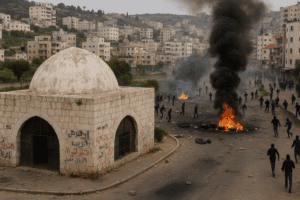Joseph’s Tomb Chaos: 5 Explosive Reasons This Sacred Site Could Ignite the West Bank
Tensions flared at Joseph’s Tomb in Nablus after Israeli civilians defied military protocols and entered the Palestinian-administered Area A without IDF coordination, violating Israeli law. Palestinians responded by throwing stones, met with retaliation from the Israelis, resulting in injuries and necessitating IDF intervention to evacuate the group and seal entry points. This incident underscores the tomb’s role as a persistent flashpoint, where deep religious significance for Jews collides with its location in a zone under full Palestinian control. The IDF’s unusual public emphasis on the entry being “dangerous and prohibited” reveals the strain such unauthorized actions place on security coordination.
Uncoordinated visits, especially during sensitive times like Rosh Chodesh, weaponize faith against a fragile legal framework, eroding trust and challenging sovereignty. These confrontations are not merely clashes but rituals of mutual frustration reflecting the conflict’s unresolved core issues. Sustainable resolution requires stricter enforcement against rogue entries and reinforced mechanisms for protected, coordinated religious access to prevent this sacred site from triggering wider unrest.

On June 27, 2025, clashes erupted at Joseph’s Tomb in Nablus after Israeli civilians entered the Palestinian-administered city without IDF coordination—a violation of Israeli law. Palestinians responded by hurling stones; Israelis retaliated. The IDF intervened, evacuating the civilians and sealing Nablus entry points. Several Israelis sustained injuries.
Why This Isn’t Just “Another Clash”
- The Legal Fault Line:
- Joseph’s Tomb sits in Area A (under full Palestinian control per Oslo Accords). Israeli civilian entry is strictly prohibited without military coordination. This group’s deliberate bypassing of protocols wasn’t merely reckless—it challenged the legal framework governing the West Bank’s divided sovereignty.
- The Sacred Flashpoint:
The tomb is revered by Jews as the burial site of biblical Joseph and by Muslims as Yusuf’s sanctuary. Its location deep inside Nablus—a Palestinian stronghold—makes pilgrimages inherently volatile. Uncoordinated visits, especially on religious dates like Rosh Chodesh (the new moon), ignite tensions precisely because they weaponize faith against geopolitics.
- The Coordination Dilemma:
The IDF stressed these visits are “dangerous and prohibited,” revealing a stark reality: even Israel’s military views unauthorized entries as destabilizing. Coordinated pilgrimages occur monthly with Palestinian security cooperation, but rogue actions undermine this fragile system, endangering both sides and straining security coordination.
The Unspoken Stakes
- For Palestinians: Unauthorized entries symbolize encroaching settler activism and eroding Palestinian authority in Area A.
- For Israeli Activists: These acts represent “freedom of worship” and resistance to territorial restrictions—a stance increasingly adopted by far-right groups.
- For the IDF: It forces troops into policing fellow Israelis, diverting resources from broader security threats.
Broader Implications
This incident underscores how religious sites become proxies for the conflict’s core issues: sovereignty, trust, and control. When coordination collapses, stone-throwing isn’t just chaos—it’s a ritual of mutual frustration. It also risks triggering wider unrest, particularly amid stalled political talks and heightened West Bank settler activism post-October 7.
The Path Ahead
Sustainable solutions require:
- Stricter Israeli enforcement against unauthorized entries.
- Enhanced Palestinian-Israeli security dialogue to protect coordinated religious access.
- International pressure to de-weaponize holy sites.
Until then, Joseph’s Tomb will remain a tinderbox—where faith, politics, and defiance collide.
You must be logged in to post a comment.